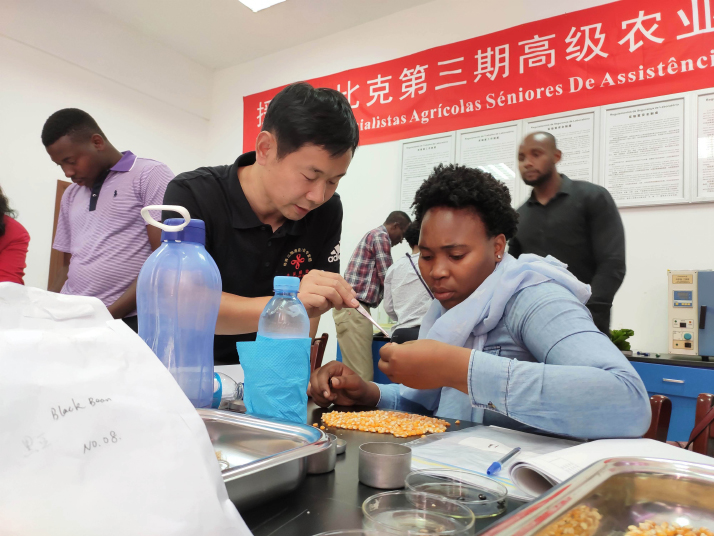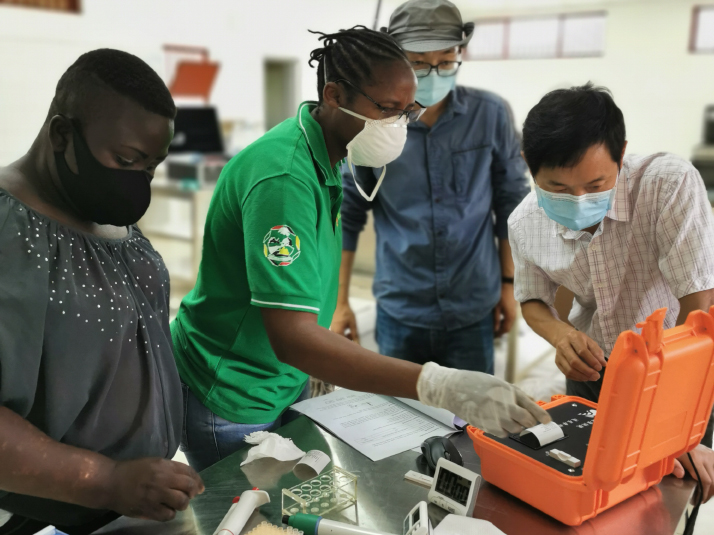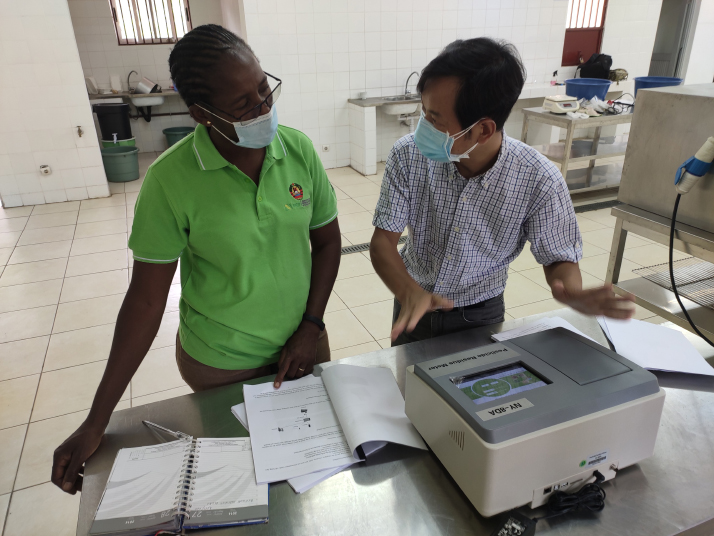|
||||||||||
| Home Nation World Business Opinion Lifestyle ChinAfrica Multimedia Columnists Documents Special Reports |
|
||||||||||
| Home Nation World Business Opinion Lifestyle ChinAfrica Multimedia Columnists Documents Special Reports |
| ChinAfrica |
| Chinese experts bring equipment and expertise to facilitate agricultural testing in Mozambique |
| Chinese medical teams have treated over a million patients in Mozambique, and agricultural experts have helped improve local agricultural development |
| By Li Kaizhi VOL.13 APRIL 2021 ·2021-03-26 |

Crisscrossing rivers, coastal scenery, cashew nuts and warmhearted people - all these metaphors can be used to describe Mozambique.
In June 1975, China established diplomatic relations with Mozambique, which have developed in an all-round way over the past decades. The Maputo Bridge, dubbed the city's new postcard, is the longest twin-tower suspension bridge in Africa, built by a Chinese company. Chinese medical teams have treated over a million patients in the country, and agricultural experts have helped improve local agricultural development.
Wu Guiyun, 51, is one of members of the Chinese agricultural expert teams. He is a senior agronomist from Deyang, Sichuan Province in southwest China. He has been engaged in seed production and quality testing, as well as quality testing of agricultural products for 26 years. His three-year assistance to Mozambique began in December 2018.

Leading by example
The Umbeluzi Research Station of the Agricultural Research Institute of Mozambique (IIAM) is where Wu conducts his work. "The priority of our mission is to carry out experiments, training and research on the quality testing of agricultural products and seeds in local areas," he said.
According to him, Mozambique is relatively weak in the fields of chemical composition analysis and quality testing of agricultural products. Only the National Seed Authority is able to conduct seed quality testing with limited capacity.
"During the first visit to our lab in Mozambique, I was greeted by almost an empty room. There were only a fruit and vegetable kiln, an aging vacuum sealer, a gas cooker and a refrigerator," Wu said.
After talking with Atumane Nuro, the head of this experimental unit, and Isabel Monjane, director of the lab, Wu and other Chinese experts decided to reach out to the Center of International Cooperation Service under China's Ministry of Agriculture and Rural Affairs. Testing devices and instruments were then donated to the unit. At the same time, they also repaired some equipment in the lab, laying the foundation for the immediate start of basic testing.
Over the years, detection of Aflatoxin and pesticide residue has always been the top priority in agricultural testing. "The operating procedures of these two projects are quite complex, requiring reagent configuration, pre-treatment of sample and testing," Wu told ChinAfrica. With equipment from China in place, he successively carried out experimental tests on Aflatoxin in food and pesticide residue in vegetables and fruits.
"In the past, Mozambique has never completed such tests due to funding shortage and the lack of the necessary conditions for the transport and preservation of reagents," Wu said.
It was Wu's pragmatic working style that helped improve the agricultural testing capability of Mozambique. "His work has been effective. We are eager to learn the techniques for both tests. And we are grateful to him for teaching us new skills," Olga Lurdes Jossias Fafetine, head of the IIAM, said.
To meet the needs of cultivating different commercial crops, the expert team also carried out a number of experiments on measuring soil nutrient, determining hydrogen cyanide content in cassava roots and stalks, dehydrating and drying vegetables, as well as making fruit jam. All these have achieved remarkable results.

Teaching skills
Seed production is crucial in Wu's eyes. "Seeds are the 'chips' of food production. The IIAM is responsible for most of the seed production in the country. However, the technologies are yet to be standardized, and the institute lacks appropriate testing rooms and supporting equipment," Wu said. "That's the reason why seed quality testing is one of the priorities of our work," he added.
He then provided training on seed quality testing such as sampling, clarity analysis, moisture measurement and germination rate detection to technical staff of units under the IIAM and International Rice Research Institute. "The laboratory testing of seed quality and field purity testing represents a new start for the IIAM," Wu said.
Since then, at the request of the Mozambican side, he has carried out regular technical trainings. In the rice fields of Umbeluzi Research Station, he provided guidance to the technicians on rice seed production.
"All these trainings have been conducted in accordance with the requirements of Mozambique. Most of my students are employees of the research station and interns from agricultural schools," Wu said. "In the next step, we will establish a standard seed production system and demonstration field."
Wu also learned that Mozambique is a country with high consumption of beans. But people usually stew beans, and can hardly find bean sprouts in local supermarkets. Wu hence saw great potential for cultivating nutritious and delicious bean sprouts locally.
He started to cultivate bean sprouts with local mung beans and summarized his experience into a manual for home growing of bean sprouts. The manual was translated into Portuguese, a good help to local people.
Using livestreaming, he also conducted online trainings for local agricultural school students. "After hands-on experiments, many students have successfully grown bean sprouts and are sharing them with their families," Wu said.

Wearing many hats
In addition to completing his own work, Wu also volunteered to shoulder more responsibilities and served as a cashier for the expert team.
He Changyong, leader of the expert team, said that Wu has helped to improve local capacity in the field and was highly praised by the Mozambican side. As a member of the expert team, he was eager to offer help to colleagues. "As a promoter of people-to-people exchanges between China and Africa, he has done everything with his heart and soul and helped our African friends solve practical problems," He said.
Traveling is one of Wu's hobbies. He has been to countries such as Laos, Thailand and Malaysia. He has also made several trips to Viet Nam to help with local rice production. Wu is also an avid photographer.
Born in the 1970s, Wu has lived through poverty and experienced the rapid economic growth of China. "Mozambique reminds me of the old days. And I hope my African friends can live a better life soon," he said. CA
(Print Edition Title: Filling the Gap)
Comments to likzh@chinafrica.cn
| About Us | Contact Us | Advertise with Us | Subscribe |
| Copyright Beijing Review All rights reserved 京ICP备08005356号-5 京公网安备110102005860号 |